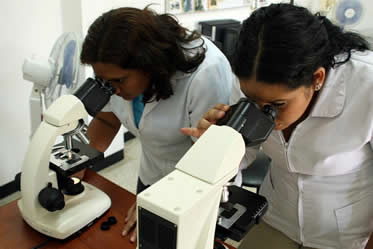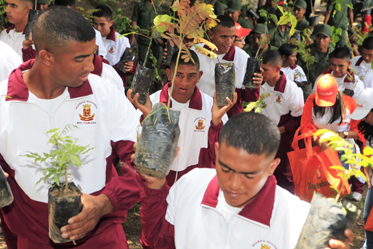|
2 News Articles Scientific Projects in Venezuela Received $465 Million in 2012
Venezuela’s Vice Minister for Science and Technology, Guillero Barreto, announced Saturday that the government provided $465 million in financing for 1,600 science and technology projects in 2012. Of those projects, 46% were conducted at universities around the country. Barreto offered this data in response to criticisms by conservative spokespersons who claimed that science and technology isn’t supported by the current government. In a program on Venezolana de Televisión (VTV), Barreto said: “We have democratized Access to resources: Now it’s not just a few universities and a few actors receiving the benefits, but rather many universities and many actors.” He said pointed out that the numbers have been growing: in 2011, 19 universities received funding for projects, while in 2012, 40 institutions got funding. He expressed optimism that even more financing will be provided in 2013 to support innovative projects from many sectors throughout the country in order to strengthen scientific development. In 2012, Venezuela approved a Law on Science, Technology and Innovation, which established $1.3 million in funding for this sector, an increase of 253% over 2011. The funding comes from contribution from large businesses with annual profits of over $2 million. “This allows us to make significant investments in all the areas of investigation and for diverse programs ranging from research projects to technological innovations and the incorporation of these innovations into productive sectors,” Barreto said. So far this year, $39.5 million in financing has been granted to 211 projects. This year’s initiatives include projects to interpret and process satellite images to reinforce plans related to the Miranda Satellite, which was launched last October. Barreto mentioned that a construction project is currently underway to build a plant to produce LED light bulbs. These light bulbs are more energy efficient and environmentally friendly, and the generate less heat and burn for longer than traditional incandescent light bulbs. Green Spaces in Venezuela Help Minimize Harmful Emissions
Venezuela is putting into practice various strategies to minimize harmful carbon dioxide (CO2) emissions derived from energy consumption, including planting trees. Venezuela’s Ministry of the Environment has promoted a program called “Mission Tree” throughout the country since 2006, and so far, the program has reforested more than 34,000 hectares of land to contribute to emissions reductions. Forests act as “carbon sinks,” capturing and absorbing carbon dioxide during photosynthesis. The director of environmental quality for the Ministry, María Leny Matos, explained in an interview with Agencia Venezolana de Noticias: “The leaves of the trees produce chlorophyll that, when it is exposed to light, undergoes a process of photosynthesis. Photosynthesis consumes CO2 from the atmosphere, and each plant that we have helps greatly to reduce our CO2 levels.” These projects are unfolding hand-in-hand with local communities. Mission Tree has formed 4,700 conservation committees, planted about 45 million plants and built 3,809 gardens, generating 62,365 direct jobs and 107,000 indirect jobs. Matos said that planting trees is just one way to fight global warming, given that unsustainable patterns of human consumption are the main problem. For this reason, promoting energy consumption has been another key government policy in combating climate change. A program called “Mission Energy Revolution” offers Venezuelans incentives to change their behavior and habits to bring about a more efficient and rational use of energy and natural resources. This program hopes to generate change by raising the consciousness of the population, stabilizing the supply of services, meeting the demand for electricity and reducing levels of contamination and environmental impact. The Ministry of Electricity has developed several projects, such as one that substitutes traditional incandescent light bulbs with energy-saving ones in homes and public places throughout the country. This involves a public information campaign about the benefits of saving electricity. From 2006 to 2012, Mission Energy Revolution replaced 155 million light bulbs. The National Electricity Corporation, Corpoelec, plans to install another 20 million energy-saving light bulbs throughout the country. Matos said that “Here in Venezuela we have the tools… we have taken steps to reduce CO2 emissions, because each country has to do its part,” she said, mentioning that Venezuela signed the Montreal Protocol in 1987, an agreement to control ozone-depleting substances. The Montreal Protocol was designed to save the ozone layer by reducing the amount of chlorofluorocarbons, or CFCs, that are put into the atmosphere. In 2006, the Environment Ministry began converting 88 refrigerant gas companies in Venezuela, moving away from the use of Freon gases four years earlier than required. With this sustained policy, Venezuela stopped over 50 million tons of CO2 from entering the atmosphere. AVN/ Press- Venezuelan Embassy to the U.S./ February 4, 2013 |

